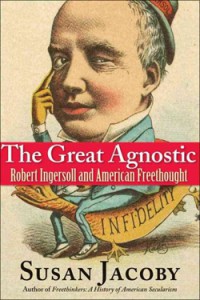Book Review: The Great Agnostic by Susan Jacoby

Let me start by saying what this book is not. The Great Agnostic by Susan Jacoby is not a biography of Robert Ingersoll. It is, rather, an argument for restoring Ingersoll to a respected place in the pantheon of American thinkers.
The book does give a brief outline of Robert Ingersoll’s life, known even in his own time as “The Great Agnostic.” Born in 1833 in the small town of Dresden, New York, Ingersoll became a lawyer, a Civil War cavalry colonel, and an influential Congressman, coming to public fame in 1876 with his nomination speech of James Blaine at the Republican convention that year. His oratorical skills quickly made him a desired public speaker, and he remained so throughout his life.
But even as he found fame, he also found notoriety, for although his views on religion were at first largely unknown to the general public, he never hid them, and as his fame grew his atheism (or agnosticism, terms he saw as synonymous) came to the fore. At a time in this country when oratory was a spectator sport, his incredible gifts for public oratory, wit, and erudition caused his fame spread quickly, and soon he was making a handsome living from the lecture circuit, pushing his ideas for women’s equality, for Darwinism, and against religion. Ingersoll was truly one of the great popularizers of these ideas among the American public, a virtual one-stop shopping for progressive ideals. He actively sought out audiences who did not agree with him, and along with his lectures he was a frequent debater as well.
Jacoby lets Ingersoll’s ideas come from his own words, frequently quoting from the numerous contemporary accounts and collections of his speeches. She is quick to point out that these probably do not do justice to his actual presentation—Ingersoll was more performance artist than writer. He knew his arguments and could tailor them to the needs of the night, to the mood of the audience, to the particular arguments raised against him. In some ways, that explains why he is no longer as iconic a figure as he was in his own day. The force of his personality could not be captured the way it would have been today, when television and YouTube would have preserved the skills that made him such a star of his time.
To readers of Susan Jacoby’s other books, particularly “Freethinkers,” some of this will be familiar terrain. Ingersoll was a major presence in that book, and I remember at the time thinking he deserved a book all of his own. I would still like to see a more complete biography of him. But Jacoby’s book is nonetheless fascinating, and a solid argument for restoring Ingersoll to his place among the pantheon of American thinkers.
Susan Jacoby’s “The Great Agnostic: Robert Ingersoll and American Freethought” is available on Amazon.com and other major booksellers.
